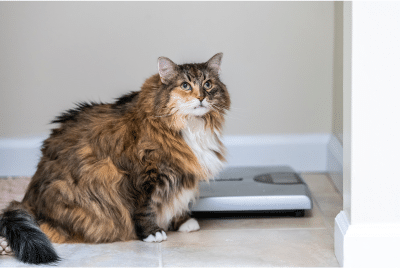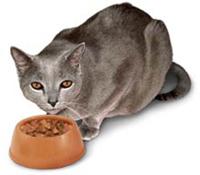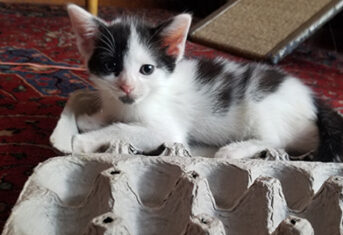Understanding Chonky Cats: The Risks and Realities of Feline Obesity

Understanding Chonky Cats: The Risks and Realities of Feline Obesity
June is Adopt a Shelter Cat Month, and we’re highlighting our feline friends throughout the month with a series of cat-focused posts. Last week’s blogpost highlighted the risk of the ongoing H5N1 highly pathogenic avian influenza outbreak for your cat. Today I am blogging about chonk.
What is Chonk?
Pages and pages across the internet and reams of social media accounts are devoted to the chonky cat. According to cats.com, [the chonky cat is] “considered to be the ideal size for hugs and snuggles… fat cats have been celebrated at an almost world-wide level. Their big bodies bring smiles and laughs and are often the basis of the Internet’s best funny videos and memes.” While chonk has a high entertainment factor, it is a feline health risk and I’ll outline why below.
How to Tell if Your Cat is Overweight or Obese
Sixty percent of cats in the United States are overweight or obese. This means there is a good chance if you own a cat, you have a chonky one. While it’s best to have your pet’s weight measured and managed professionally by a veterinarian, there are simple methods for determining your pet’s body condition at home. These include consulting a body condition scoring chart and the “hand trick.”

Diseases and Conditions Associated with Feline Obesity
Because obesity is so common in cats, many studies have addressed the impact of excess weight on feline health. In a study out of Sydney, Australia, British shorthair and domestic cats were at risk for obesity, and male and female cats were equally overweight. Conditions associated with excess weight in cats include diabetes, lameness and non-allergic skin disease, according to a 1998 study. The biggest impact of obesity is a five-fold increase in lameness— limping and an inability to walk, run, or jump normally—in overweight cats compared to cats of an ideal body weight or underweight cats. Veterinarians have fewer arthritis medications for cats than we do for dogs, so preventing arthritis and lameness is key to maintaining a good quality of life in your cat.
Consequences of Feline Weight Gain on Gut Health
A recent study shed light on the myriad health concerns resulting from weight gain in cats. The cats participating in the study were allowed to free feed for four months and gained, on average, a pound and a half. After those four months, the cats’ gastrointestinal transit time (time from eating food to that food being deposited in the litterbox as cat poop) decreased and nutrient extraction also decreased. In addition, the excess food changed the types of bacteria in the overfed cats’ intestine. While more investigation is necessary, the changes in gastrointestinal efficiency and bacterial makeup may be connected to obesity-related diseases like arthritis and diabetes.
How to Help an Chonky Cat Lose Weight
To help an overweight or obese cat lose weight, talk to your veterinarian about a tailored weight loss plan for your cat. This should include two main components: diet and exercise. Portion control and balanced, high-quality food sources are staples of a healthy diet, while playtime and environmental enrichment can help keep your cat active.
And if your cat needs advanced treatment for lameness and arthritis, AMC’s Sports Medicine, Rehabilitation, and Integrative Medicine Service employs a variety of modalities (including everyone’s favorite, the underwater treadmill) to help return pets to normal functioning.

































